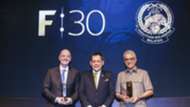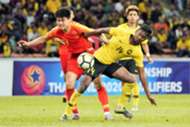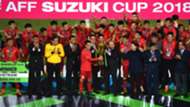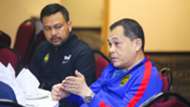
The FAM President looks back at 12 months in the hot seat and reflect over the good, the bad and what’s to come in this exclusive with Goal.
Banker turned football administrator, Dato’ Haji Hamidin Bin Haji Mohd Amin has risen through the footballing pyramid in Malaysia and after 23 years, he took on arguably the biggest job within the sport in July of 2018 when he was installed as the new President of Football Association of Malaysia (FAM).
Taking over the role from HRH Tunku Ismail Sultan Ibrahim who decided to focus solely on the Malaysian Football League (MFL), Hamidin took the up the mantle and in these 12 months have progressively made fundamental changes to the governing body of the sport in Malaysia through various new projects and plans.
The F:30 roadmap, Affiliates’ Capability Enhancement (ACE), Suparimau, Malaysian Football DNA and the Malaysia Premier Futsal League have all been rolled out over the course of these 365 days – all catering to the various areas, functions and categories encapsulating all tiers of football in the country.
With so many years of footballing administration under his belt, the now 54-year-old Hamidin is not the wide-eyed upstart who joined Football Association of Selangor (FAS) as Executive Secretary back in 1995 and knew full well that his term as the president has to be defined by something definitive – the massive F:30 roadmap.

“As you know, I’m the first ordinary person to become president. Before this were cabinet ministers, Sultan or Crown Prince. It was never my dream or thinking to be a president. I’ve always thought that being general-secretary would have been the limit. But there’s no doubt that all my years of being various departments have helped me to run for president role.
“When I became president, I knew that we have to set the plan, which is the F:30 roadmap. So we sat down with my staff and we knew we must set our vision so that everyone from fans to affiliates and media all know what the plan is.
“It was good also that we managed to get FIFA president Gianni Infantino and AFC president Sheikh Salman to support us during the launch. Every time I met them afterwards, they are always asking what is the plan and what have we done so far.
“After all the things have been put in place in this first year, now the second and third year we have to see the implementation. That’s why every three months we will give an update on the progress of the F:30 so that everyone will know.
“If in the future, FIFA or AFC announce something new and we need to get in-line with them, then we will make adjustments to the roadmap to suit it. The roadmap is a live and living plan, not something set in stone. If there are changes to improve it that we can do, we will do it. But of course it is not simply adjust. If we do it, then we will have to explain to people why we do it,” explained Hamidin to Goal.
Setting the bar higher than usual
The roadmap was not something out of this world nor fully 100% innovative but within it defined the structures and means, outlined the steps and directions, and in doing so, set in motion a working understanding of what every single stakeholder must contribute in order to raise the standard of Malaysian football.
There are lofty targets in the roadmap like reaching the 2023 Asian Cup, to be among the top 100 ranked teams in the FIFA rankings by 2026 and breaking the 70 mark by 2030. The one which now stands out like a sore thumb is targeting to reach the 2020 Tokyo Olympics, a bridge too far for Malaysia to cross back in March of 2019.
Ong Kim Swee’s Under-23 side stayed unbeaten in three matches in the qualifying round but the lack of goals in the penultimate match against Laos as well as the draw against Guus Hiddink’s China on the final day meant that there will be no repeat of Malaysia’s appearance in the AFC U23 Championship finals.
The exit was an early unwanted blemish on what is a comprehensive, albeit ambitious roadmap which begs the question – why set such a high target for a qualifier that is just eight months into his first year as the president? Hamidin knew the massive risk he was taking but also wanted his organisation to stop living within the comfort zone.

“Of course there will be obstacles and everything progress at a different rate. That’s why we cannot go simultaneously 10%, 20% and so on with every single item in the roadmap. Like performance, people said that we failed to qualify for the Olympics. During the preparations, that was the only one that I put to the committee that they were not happy with. The committee wanted 2024 to be the target and that is more plausible.
“But I wanted all my staff, coach and players to work hard. Japan, Korea and even China told me we had a good team but just didn’t have the luck. Certain media criticised why put the target when it’s so close to the start of the roadmap. That’s okay. My philosophy is not to look to sack anyone because they failed the target.
“This is the target and when things isn’t successful, we must get the report on why it happened and we analyse. If we really think we’re not happy with how they performed, then we change. You could say, that was something I did to test the market.
“Under my leadership as I’ve announced before – SEA Games and AFF we must reach the final. That’s the benchmark. I cannot put semi-final because my people will be lazy. We must put higher because no one can accept just entering the semis and playing let’s say, Myanmar. The benchmark must always be reasonably higher because we want to move forward.
“I had the feeling that there were some staff who felt that I was too pushy with the target set. But everyone must take full responsibility because outside, the fans always want the national team to be successful. If we put the index lower, it will be worse. They are worried that if the target isn’t achieved, they will get the hit. But the reality is, whether you win or not, you will get hit. So you must take responsibility and fight.”
Not Plan A, Not Plan B but Plan A-Z
As the governing body of football in Malaysia, the result of the national team is one that fans and critics alike will always associate with FAM and that is the burden that Hamidin will have to bear in his position. When the national team does well, it will be linked with him. When the national team fares badly, it will be linked to him as well.
Those before him have taken many different approaches to improve the national team at all levels to varying degree of success and Hamidin’s approach is one which says – try everything and leave no stones unturned in hope that every little bit pushes the national team along in the right path.
In trying not to put pin his hope on only one single basket, he is ensuring that there are multiple baskets in used concurrently. And even if not every basket is filled to the brim, the cumulative total will still enable Malaysia’s football to prosper in the long run.
One of the biggest and perhaps the most difficult plan to achieve in his arsenal of plans is to make football a national agenda. That is to put football as the driver for Malaysia as a country with the unbridled support of the government, just like how Asia’s footballing juggernaut Japan has been able to do with theirs.

“I know about the netizens and what they do. I love when fans they criticise FAM but they give their ideas. If anyone got any ideas, then we are more than happy to listen. If to condemn just for the sake of condemning then our football will not improve at all.
“As a president, I try to do what I think is best. But perhaps there are things that we missed out. For example, if I don’t do naturalised player for national team, then people will be telling me about it. So what else is there I can do, I’m always open to listen to any suggestions.
“I can’t share the details but what I can say is that the government is very supportive to our plans. Like the naturalised player route, that is not something easy for the government but they are receptive to that plan. For the national training centre in Putrajaya, we asked for the lease and hopefully it. That land isn’t FAM’s but it is gazetted for national football. We want to get the funding from FIFA to develop the land and for that we need the land to be under FAM with a minimum 30 years lease.
“We asked A, B, C, D and E. They will be okay with D and E while A to C will need further discussions between the two groups. But for me, I’m happy with our all the meetings have gone that included NFDP, training centre as well as financial assistance.
“I’m keen for us to try to follow the path taken by JFA (Japan Football Association) because before this they were below us and after 1983, they went ahead of us. Their J-League have also failed three years then came back strong. Most importantly they are in Asian, because I don’t want to compare with Europeans countries as their cultures are very different from us. Japan is the best example.
“I’ve been there many times to meet their sports ministers, prime minister, teams and presidents. The government, the media, the GLC, the fans and JFA all joined hands to work together and prepared a 50-year plan. It is a national football agenda for them. That is something which I want for Malaysia. This is something that I’ve shared with the Malaysian government and they like the idea.”
Sub 130 in FIFA rankings by end of presidency term
The FIFA rankings is something which a lot of Malaysian fans hang their hat on but that is neither here nor there. While the rankings provides a quantitative guide to the strength and quality of a particular nation, it is not definitive. Belgium are the top ranked team at the moment but they aren’t the World nor European champions.
When Hamidin started with FAS back in 1995, Malaysia were in the heady heights of 106 but over the since has seen a steady decline of the national team in the FIFA rankings. Last year saw Malaysia occupied 178th spot at one point but Hamidin’s term has coincided in slight improvements within that context.
Now ranked 159, Malaysia are the fifth best team from Southeast Asia behind Vietnam, Thailand, Philippines and Myanmar. The latter two being ranked higher only served to add to the notion that the rankings can be misleading given that Malaysia could rightfully claim to be a better team than them.
The term of Hamidin’s presidency role ends in 2021 and he’s confident that if everyone pulls their weight, that fans can expect the team to continue to rise through the rankings and is estimating at least a massive 29 spots that will be climbed in these remaining 23 months.

“I can’t say that I did the best but what I can say is that I go for the maximum using my experience and at the same time keep checking with people around me whether there’s anything I’ve missed or not. This one year went by very fast and it feels as though I’ve been a president for 10 years.
“At the moment I’m happy. If you ask me what has pleased me from this first year, it’s all that we managed to launch because that means that I’m able to discharge my duties. Of course there are things we could do better and things we can work harder on.
“The upcoming World Cup and Asian Cup qualifications will be very interesting. We really have to do everything we can to go as far as we can. I said to Tan Cheng Hoe after the Timor Leste game that we must do something like Vietnam.
“Vietnam president and coach said to me after the AFF that our players have good size and tactical but lacked of commitment. Said their players are small size but run everywhere and gave 200% commitment. That’s the difference between the two teams. If Vietnam can make upset results in the U23 and Asian Games, why can’t we do the same?
“Before next congress election in 2021, I’m not confident that our FIFA rankings will be able to reach 80, 90 or even 100 because it’s only a 2-year period. The problem is the limited number of matches that will be available during that period. Add to that what we will have in the next one year is competitive qualifying matches which will be tough, not friendly matches. If we get up to 120, that will be superb but we should be targeting to hit around the 120-130 mark.”
Continuous improvement, structurally and talent
It’s only a short period of time in the context of the grand scheme of things for Hamidin as the president. He only has office until July 2021 but his grand plan stretches out to 2030. He’s mindful that the role can only be continued if everyone is on board with his leadership and for now is only concentrating on doing his best during this available period.
While there have been many changes done, it does seem that Hamidin and FAM are showing no signs of slowing down with plans for more to be done. Changes are afoot not only in terms of the standards or applicable methodology to the game but also to the people tasked with executing all the improvements.
In the past, the quality of the personnel on FAM’s books have left a lot to be desired but that is exactly the change that Hamidin wants to tackle head on. Influx of more professionally minded staff with the right set of skills have been done in the past 12 months but more is expected to be roped in to fill the gaps.
An organisation is only as strong as the base which it is built and for FAM that means packing their building with qualified professionals that are not merely ‘yes’ men or women. People who are ready to be handed the big task and face all the difficulties that come with it.

“People always ask me but I’m the type that will only think about it when the time comes. I’m going until 2021 and I’ll see where I am with the affiliates, media – everybody. Of course I won’t be able to please everyone on everything. Then I will decide. If I feel that the affiliates think that there are better people to do it, then better I don’t contest. If people want me, then I continue.
“Sometimes there are people who I’ve given my trust but they cannot give the best. There are elements to improve, in fact I’m halfway through the restructuring of the organisation. The general-secretary will give a proposal to me. There are people whom we expect to be better but they just don’t suit what we need. So when we need change, we will change. There are a few areas to improve for the good of FAM, nothing personal.
“If you ask me, many people from the professional line want to come into FAM but they are also tied up with their contract or are waiting for their contract to be done. So that is one of the obstacles. And I cannot simply create a new unit or department just to get these people in.
“We are going to do it for the betterment of FAM. You cannot have 60 staff and all of them are superb. Like it or not, 60% just coast through their games, not unlike how it is for players sometimes. There are people who are brilliant in their work outside of football but when we take them into FAM, it is hard for them to succeed in this environment. In a bank or a GLC (government-linked company), it’s different. Here it is different. Not many able to make that transition well,” said Hamidin.
There’s no such thing as a perfect president and whoever is given the responsibility to head FAM will have their own respective flaws and it is no different with Hamidin. He will be judged with the same metrics as those before him, no more no less.
But for now things are looking positive with the numerous new introductions, relative transparency and image rebuilding that FAM is currently aspiring to do. A more than decent first year in charge, now it is about maintaining and increasing momentum. Bring on year two.
Follow Goal Malaysia on Instagram

Be the first to comment